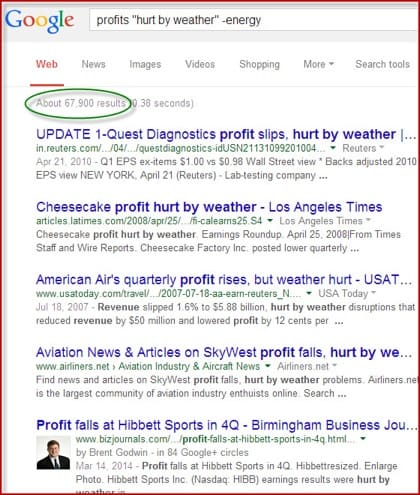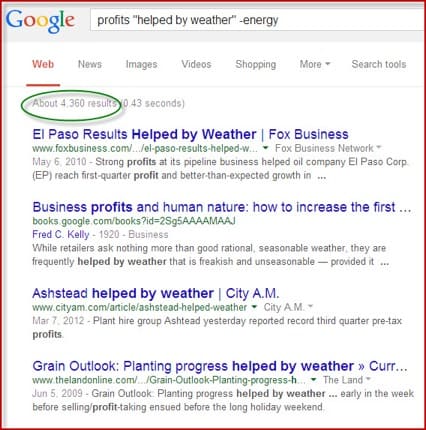It's just another day in the spin factory so let's have some fun with it.
Lately 'bad weather' was cited as the reason that Walmart and FedEx earnings were disappointing. If it isn't 'one-time' charges that happen every quarter being removed from reported results, it's the weather being blamed for somehow hurting operations.
But if the weather harms, it should also be able to help. Right? After all weather is chaotic and random, so sometimes it should be a plus and sometimes a minus. Sometimes it's colder and wetter than expected, and sometimes drier and warmer.
Well, if we do a quick Google search of the number of reported references to when weather helps vs. harms earnings it's no contest.
Weather is apparently 1,557% (15.57x) more harmful than helpful for profits (after mostly filtering out energy, which cuts both ways...as you can see an oil company is still the top result for the 'helped' category).

And:

Such is the state of reporting these days...in which a completely normal thing like weather, which happens pretty much the same way every year, give or take, can be regularly used as an excuse for poor corporate results.
Of course, even if the weather truly was awful enough to prevent people from shopping or buying a house, that demand should simply show up in a later month.
That is, unless we are supposed to now believe that a bit of bad weather can cause a family to simply give up on the idea of moving, or getting a new car, or buying clothes. If this were true, after the simply horrible winter we've had in the mid-west and New England, there should be a lot of poorly-clothed and possibly naked people walking around this spring wishing they lived in a different house.
But, alas, we won't see any such people. It's a fiction that weather has any sort of lasting impact on final sales over time.
Instead, we might suspect that poor corporate earnings are due to something simpler and far more likely: falling demand for products and services.
But if you simply read news headlines, you would be forgiven if you somehow developed the impression that weather was more than 15 times more harmful than helpful to corporate profits.
Sadly, this is the state of our self-delusional spin cycle right now. Anything and everything needs to be painted in the best possible light, as though our economy were some ageing starlet in denial, in need of heavy makeup and dim lighting.
~ Chris Martenson
This is a companion discussion topic for the original entry at https://peakprosperity.com/weather-is-1557-more-harmful-than-helpful-to-corporate-profits/

